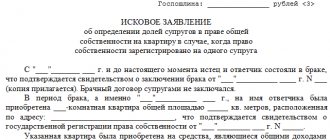Real estate transactions and the moment of emergence of ownership rights
Today, everyone understands that real estate transactions require mandatory registration with the Federal Service for State Registration, Cadastre and Cartography. The right of ownership of an individual or legal entity arises from the moment of registration of the transaction and transfer of rights in the Unified State Register of Rights to Real Estate and Transactions with It (hereinafter referred to as the Unified State Register of Real Estate). In some cases, the moment when the right arises is different.
For example, in the case of full payment of a share by a member of a cooperative, as well as in the order of inheritance and reorganization of a legal entity (paragraphs two, three, paragraph 2, paragraph 4 of Article 218 of the Civil Code of the Russian Federation, paragraph 4 of Article 1152 of the Civil Code of the Russian Federation), the right of ownership arises with the date of acquisition of such right to real estate. Therefore, if a testator or a reorganized legal entity (predecessor) owned real estate by right of ownership, this right passes to the heir or newly created legal entity, regardless of the state registration of the right to real estate.
The right of ownership of real estate in the case of acceptance of an inheritance arises from the date of opening of the inheritance (Clause 4 of Article 1152 of the Civil Code of the Russian Federation), and in the case of reorganization - from the moment of completion of the reorganization of the legal entity (Article 16 of the Federal Law “On State Registration of Legal Entities and Individual Entrepreneurs” ").
The heir or newly created legal entity is not obliged, but has the right at any time, to register ownership with the registration authority after accepting the inheritance or completing the reorganization. If the ownership right of the predecessor in law was not registered in the Unified State Register, the title documents are documents confirming the basis for the transfer of the right in the order of succession and documents of the predecessor in law indicating the legality of his acquisition of ownership of this real estate. For example, a joint stock company that was created as a result of the transformation of a state (municipal) enterprise in the manner of privatization, from the moment of its state registration in the Unified State Register of Legal Entities, becomes the owner of the property included in the privatization plan (or transfer deed) as its legal successor.
There are features of the moment when organizations acquire ownership of property transferred to them as contributions (contributions) by their founders (participants, members), as well as property acquired by these legal entities for other reasons. For example, if movable property was made as a contribution to the authorized capital before the state registration of a legal entity, the legal entity’s right of ownership of the property arises from the date of such registration. And if movable property is made as a contribution to the authorized capital after the state registration of a legal entity, the ownership of this legal entity arises from the moment the property is transferred to it, unless otherwise provided by law or by the participants of the legal entity (Clause 1 of Article 223 of the Civil Code of the Russian Federation). When real estate is contributed as a contribution to the authorized capital of a legal entity, the ownership of this property arises from the moment of state registration of the right of such legal entity in the Unified State Register.
A citizen or legal entity who is not the owner of real estate, but who in good faith, openly and continuously owns it as his own for fifteen years or other property for five years, acquires the right of ownership of this property (acquisitive prescription) by virtue of clause 1 of Art. 234 Civil Code of the Russian Federation. There was such a case in the practice of law when citizen S. came to the law office for a consultation having already received a negative court decision for him with a request to write a cassation appeal. The claims of citizen S. were based on Article 234 of the Civil Code of the Russian Federation, where he indicated that he had been using his apartment under a lease agreement with an organization for 20 years. We advised that the court reasonably rejected the claim and stated that “possession of property as one’s own means possession not by contract. For this reason, Article 234 of the Civil Code of the Russian Federation is not applicable in cases where ownership of property is carried out on the basis of contractual obligations (rent, storage, gratuitous use, etc.).”
Within the meaning of Art. 225 and 234 of the Civil Code of the Russian Federation, the right of ownership, due to acquisitive prescription, can be acquired for ownerless property. Due to this, a person, before acquiring ownership of property by virtue of acquisitive prescription, has the right to protect his possession. A person who believes that he has become the owner of property due to acquisitive prescription has the right to apply to the court with a claim for recognition of his ownership rights. The defendant in a claim for recognition of property rights due to acquisitive prescription is the previous owner of the property, if he is known. Otherwise, you have the right to apply to the court to establish the fact of bona fide, open and continuous possession of the property as your own during the period of acquisitive limitation. At the same time, you must involve the state registrar as an interested party in the case. Having received a court decision to satisfy the claim for recognition of ownership rights due to acquisitive prescription, you can safely register your ownership rights in the Unified State Register. In our practice, we have brought claims under Art. 268 Code of Civil Procedure of the Russian Federation or Part 3 of Art. 222 of the Arbitration Procedure Code of the Russian Federation on establishing the fact of bona fide, open and continuous ownership of property as one’s own during the period of acquisitive limitation, and a positive decision was the basis for registering property rights in the Unified State Register.
Let us turn to the question of when the right of ownership to an unauthorized construction arises. By virtue of clause 3 of Art. 222 of the Civil Code of the Russian Federation, the right of ownership of an unauthorized construction may be recognized by the court as belonging to a person (copyright holder) who has ownership, lifelong inheritable possession, and whose permanent (indefinite) use is the land plot where the construction was carried out.
If an unauthorized construction is carried out on a land plot that does not belong to the developer, but the necessary permits for its creation have been obtained, the owner of the land plot has the right to file a claim for recognition of ownership of the unauthorized construction. The defendant in such a claim is the developer. In this case, the developer has the right to demand reimbursement of construction costs from the copyright holder.
If an unauthorized construction is carried out on a land plot owned by the developer, but the necessary permits for its creation have not been obtained, the defendant in the developer’s claim for recognition of ownership of the unauthorized construction is the local government body on whose territory the unauthorized construction is located.
If we turn to the practice of law, it is known that the courts, when considering this category of cases, establish whether during the construction of a building there were violations of urban planning and construction standards, whether such a building poses a threat to the life and health of citizens, and appoint an examination for this. A claim for recognition of ownership of an unauthorized construction is satisfied by the court if the only signs of an unauthorized construction are the absence of a construction permit and/or the absence of an act of putting the facility into operation, to obtain which the person who created the unauthorized construction took measures. In all cases of a positive decision, the court establishes that the construction does not violate the rights and legally protected interests of other persons and does not create a threat to the life and health of citizens.
Heirs of such property often have questions. Since the unauthorized construction is not property legally owned by the testator, it is not included in the estate. The heirs who accepted the inheritance - the land plot on which the construction was carried out, have the right to demand recognition of their ownership of it.
And persons whose property rights or legal possession are violated by the preservation of such objects can also go to court to protect their rights on the subject of the claim to eliminate the violation of the right, not associated with deprivation of possession (in accordance with Article 304 of the Civil Code of the Russian Federation). If an unauthorized facility, which is not a new facility, creates a threat to the life and health of citizens, interested parties have the right, on the basis of clause 1 of Art. 1065 of the Civil Code of the Russian Federation, file a lawsuit to prohibit the operation of this facility.
We are often asked the question whether an unfinished construction project as real estate can be recognized as an unauthorized construction. Yes, and all the above-mentioned norms of the Civil Code of the Russian Federation apply to it.
Unlock access to the private part of Clerk with a Premium subscription. Get hundreds of webinars and online courses, unlimited consultations and other proprietary content for accountants.
Hurry up to subscribe with a 20% discount until October 15, 2021. Read more about “Premium” here.
Claim for the right to real estate
Claims for rights to real estate include, in particular, claims for reclaiming property from someone else’s illegal possession, for eliminating violations of law not related to deprivation of possession, for recognition of rights, for establishing an easement, for establishing the boundaries of a land plot, for releasing property from arrest.
If at the stage of accepting the claim the court comes to the conclusion that the chosen method of protecting the right of ownership or other property right cannot ensure its restoration, this circumstance is not a basis for refusing to accept the statement of claim, returning it or leaving it without progress.
In accordance with Art. 148 Code of Civil Procedure of the Russian Federation or Art. 133 of the Arbitration Procedure Code of the Russian Federation, at the stage of preparing a case for trial, the court must determine from what legal relationship the dispute arose and what rules of law are to be applied when resolving the case.
When making a decision, the court is in force with Part 1 of Art. 196 Code of Civil Procedure of the Russian Federation or Part 1 of Art. 168 of the Arbitration Procedure Code of the Russian Federation determines which rules of law should be applied to the established circumstances. According to clause 3, part 4, art. 170 of the Arbitration Procedure Code of the Russian Federation, the arbitration court also indicates in the reasoning part of the decision the reasons for which it did not apply the rules of law referred to by the persons participating in the case. In this regard, the plaintiff’s reference in the statement of claim to rules of law that, in the opinion of the court, are not applicable in this case in itself is not a basis for refusing to satisfy the stated claim.
Within the meaning of Parts 2 and 3 of Art. 61 Code of Civil Procedure of the Russian Federation or parts 2, 3 of Art. 69 of the Arbitration Procedure Code of the Russian Federation, the circumstances established during the consideration of a case on a claim for the right to property are not binding for persons who did not participate in the case. Such persons may apply to the court with an independent claim for the right to this property. At the same time, when considering the said claim, the court takes into account the circumstances of a previously considered case on the right to the disputed property, regardless of whether they were established by a judicial act of a court of general jurisdiction or an arbitration court. If the court comes to conclusions other than those contained in the judicial act in a previously considered case, it must indicate the corresponding reasons.
What is this?
The right of ownership (as defined in Article 209 of the Civil Code of the Russian Federation) allows a citizen to own, use and dispose of his property. These components of the right can exist and occur separately and at different times.
For example, the right of ownership may arise after signing an act of acceptance and transfer of property. Relevant when buying an apartment in a new building.
The right of use appears when signing a sales contract (SPA) or donation, exchange, etc.
A person can exercise the right to dispose of real estate only after its state registration has occurred.
People become owners of real estate in several different ways:
- by inheritance;
- by deed of gift;
- as a result of exchange;
- under the privatization program;
- according to monetary policy (including for a mortgage);
- equity participation in construction;
- independent (on your own) construction
Let's consider all cases separately.
In exchange
Ownership of the apartment comes at the moment of its registration in Rosreestr. This is the final stage of registration of real estate rights.
All previous actions - drawing up an exchange agreement, signing a transfer and acceptance certificate - are only necessary legal actions (everything begins with them) for the subsequent registration of rights. Only after the completion of the procedure for making an entry in the Unified State Register, the property received as a result of the exchange can be considered in full possession of the new owner.
Kinds
Types of property are divided into three large groups:
- State (federal or regional).
- Municipal (city, rural settlement or municipality).
- Private (individuals or legal entities).
The private one, in turn, is divided into:
- individual (when there is only one owner);
- general joint (shares are not indicated);
- common share (there is no clear division of shares, they are equal to those of the owners);
- shared (shares are unequal and divided by agreement or by law);
- collective (several individuals unite into a housing cooperative, etc.).
Documentation
Since July 2021, there have been many changes in the registration legislation , and they primarily affected paperwork and the replacement of several documents with one - an extract from the Unified State Register of Real Estate.
Certificate
Until 2015, the certificate of ownership was issued on a numbered form, later it was replaced by a regular A4 document, and on July 15, 2021 it was completely canceled.
It is an important document in transactions for the alienation of apartments purchased before the specified date (the seller or donor attaches it to the package of documents intended for the DCT or gift agreement). Currently it is occupied by an extract from the Unified State Register of Real Estate.
Extract from the Unified State Register
The 2021 reform of the Unified State Register was replaced by a single Unified State Register certificate . In fact, it contained the same information (about the owner, about the property, encumbrances, etc.).
An extract from the Real Estate Register is currently the main legal document.
On privatization
Privatization in our country has been going on since 1991, and its period has been extended many times. At the moment, its expiration date is not specified, that is, the program is unlimited (until the introduction of new laws).
As a result of privatization, housing passes from the ownership of the state (municipal) to the ownership of the citizen on the basis of a privatization agreement. The opportunity to participate in privatization is given to a citizen only once.
A citizen who has privatized an apartment becomes a full owner of a home only after registering with Rosreestr.
If the apartment was privatized before 1997 (when there was no mandatory registration), the date the right arose is the moment of privatization.
Example. The apartment was privatized in 1995 for mother and son; due to the absence of such a need, the transaction was not registered with government agencies. In 2015, after the death of his mother, the son entered into the right of inheritance of the property and registered it. When selling an apartment in 2021 (less than 3 years from the date of registration), he did not have to pay personal income tax on the sale, since his right arose in 1995 (more than 3 years had passed). Moreover, according to Article 235 of the Civil Code, a change in the composition of owners does not entail the termination of ownership rights, but is subject to registration (Article 217).
By deed of gift
This type of transfer of ownership is usually used by close relatives in order to avoid red tape when entering into an inheritance after the death of the donor.
The law exempts them (close relatives) from paying personal income tax (NDFL). All other persons gifted with real estate will be required to pay 13% (or 30% if they are not residents) of the market value of the real estate. In this case, the market valuation should not be lower than 70% of the cadastral value (if any). The moment from which the gifted person will be legally considered the full owner of the property will be the date of registration in the Rosreestr of the transfer of ownership. Thus, if a citizen received an apartment as a gift under an agreement dated February 1, 2010, then submitted documents for registration, received a certificate for the apartment on April 15, 2010, then he became a full owner on April 15. The moment when he was able to sell this apartment without paying personal income tax came only on April 15, 2013.
The gift deed itself does not need to be registered (as it was before 2013).








